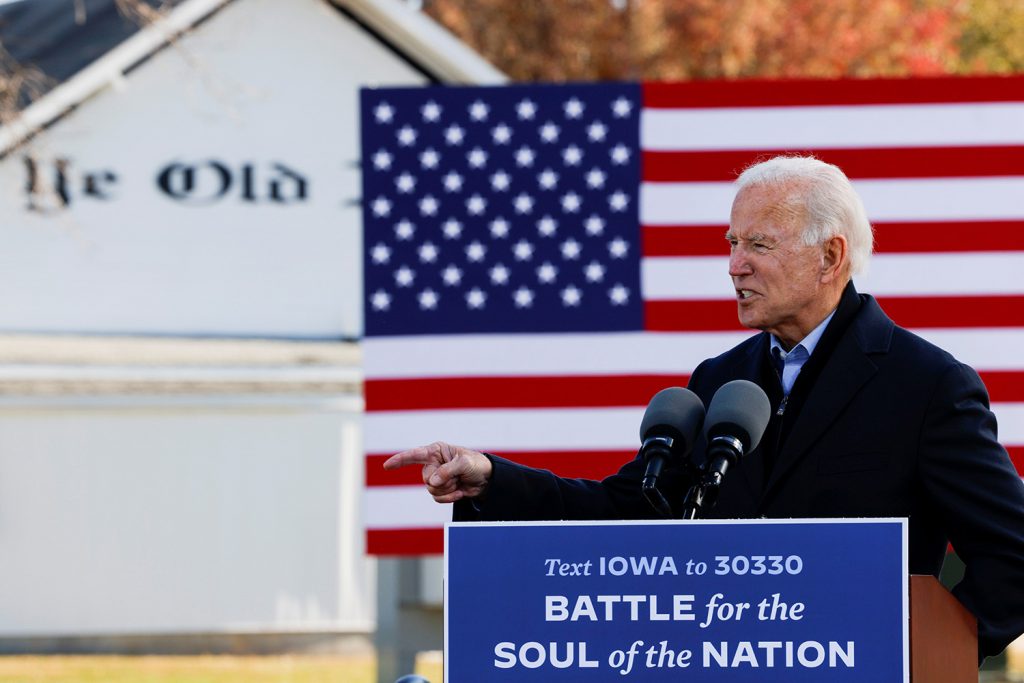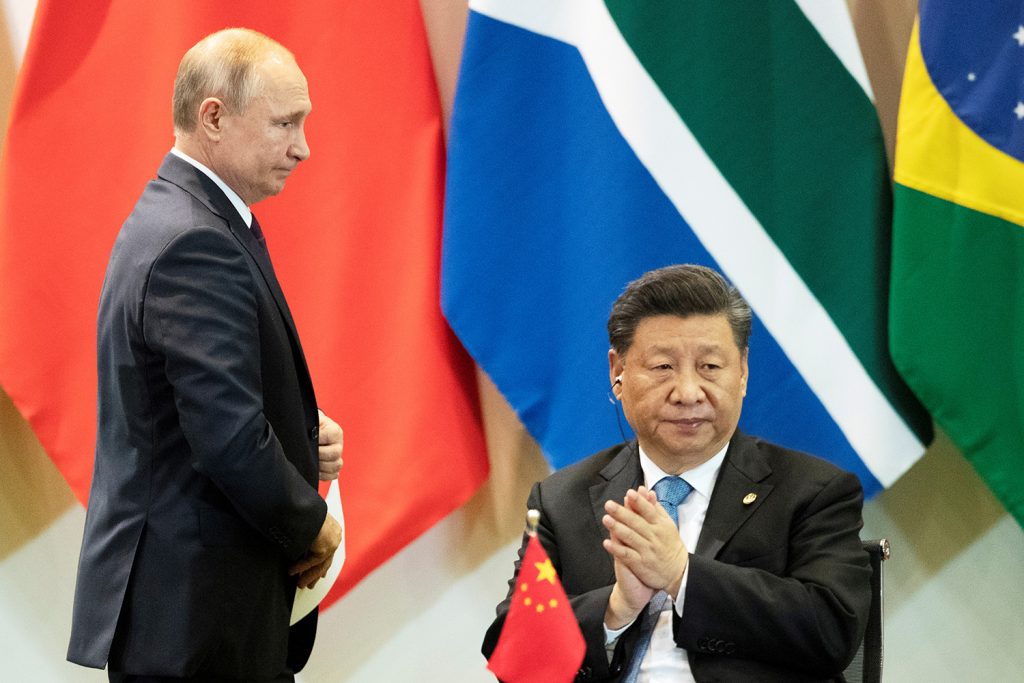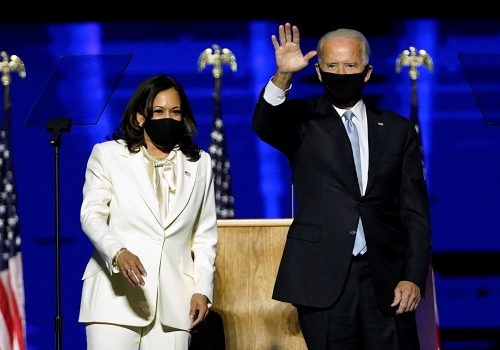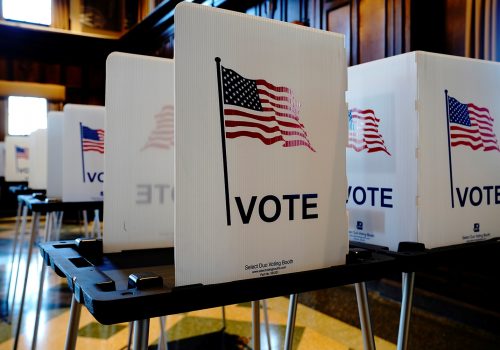An opportunity for transformational leadership
Joe Biden is on a path to become the next president of the United States, and at first glance it seems like one tending toward incremental change. While the contrast between Biden and Donald Trump is stark, the president-elect will inherit a divided nation and a divided Congress. He is a cautious pragmatist with a four-decade-long, centrist record in politics.
And yet, however unlikely it might look at the moment, Biden also has a path to become a transformational president.
The depth of crisis facing our nation combined with unprecedented global challenges, at a time when the geopolitical environment has profoundly shifted in unfavorable ways for the United States, present the incoming administration with an historic opportunity. A President Biden and Vice President Kamala Harris could seize that opportunity by leveraging renewal at home to rally allies and partners for global common cause.
Biden seems both to recognize the opportunity and inclined to take it on. Despite his modesty, Biden’s ambitions are monumental. After all, he framed his campaign as a battle for the soul of America. He has called for restoring our moral leadership as a prerequisite for progress on other challenges.
In combining attributes such as decency and respect with political acumen and long-term relationships, he is well-positioned to cultivate bipartisan consensus and earn public support at home, while forging a new model of US leadership in a world that has become more reluctant to follow America’s lead.
This task begins at home.
Biden’s foreign policy agenda will be grounded in his commitment to investing in the domestic sources of our strength, including our democracy. This will involve efforts ranging from expanding voting access to building a majority in Congress to support investments in science and technology, research and development, STEM education, 21st-century infrastructure, and a modern immigration policy. Such reforms will be aimed at fulfilling Biden’s goal of leading with “the power of our example” as an effective alternative to China’s brand of state-led authoritarian capitalism.

Biden’s foreign policy agenda will be grounded in his commitment to investing in the domestic sources of our strength, including our democracy.
Throughout his presidential campaign, Biden never went low in response to Trump and consistently reached out to all Americans, not just those who supported him. Despite the political polarization that prevails in the United States right now, he brings the relationships in Washington and habits of mind to deliver on a more bipartisan approach and legislative compromise.
But he’s also not naive; Biden bears the scars of partisanship during his tenure as Barack Obama’s vice president. With a closely divided Senate, he won’t be in a position to gain Congressional support for all of his most ambitious domestic priorities. He will, however, find far more room for maneuver on his most ambitious international priorities.
One of Biden’s political strengths is understanding the context within which he is operating. This has kept him attuned to where the American people are, but it will also help him reposition America’s role in the world. Biden appears to instinctively grasp that a changed United States is in need of a new model of leadership in a changed world, reflecting both our desire for other nations to do more and the limits of our fiscal capacity and political will. His team also senses the demand signal we’re getting from allies and partners who wish we made it easier to be our allies and partners.
This is not 1990, much less 1945, when the US economy and military were globally dominant—and the United States is neither capable nor willing to exercise dominant leadership. More importantly, other nations will no longer reflexively follow Washington. Trump’s unpredictability and badgering of allies and partners will have lasting consequences.
Adversaries such as China and Russia have gained ground and room for maneuver as the US-built, rules-based international order has frayed. Allies in Europe and Asia have learned to hedge against a potentially unreliable or ambivalent United States. And developing nations across Asia, Africa, and Latin America have become more capable and confident in pursuing their interests.

Adversaries such as China and Russia have gained ground and room for maneuver as the US-built, rules-based international order has frayed.
As the world has evolved, US administrations have failed to provide a novel template of leadership customized to today’s world. A Biden administration just might.
Biden could pioneer a form of US global engagement that resonates with our friends abroad but also the American people at home—as a catalytic actor that can convene allies and partners in common global cause to tackle systemic challenges. This is neither “leading from behind” nor engaging in bullying, bluster, and intimidation. It’s more respect. It’s less bravado. More action, less chest-thumping.
In office, Biden may combine French President Emmanuel Macron’s instincts to take action with German Chancellor Angela Merkel’s stature to do so. As far as American leaders go, his style recalls the unassuming Harry Truman and George H.W. Bush. He will banish Trump’s America First braggadocio while differing from Obama in relying more on personal bonds than on inspiring rhetoric.
What this model would ultimately be about, as Biden might put it, is leveraging the power of our example to build coalitions and achieve consensus to solve problems—to adapt the international system and shape the future rather than falling victim to it.
At the Atlantic Council, we call these our defining challenges.
While the new administration’s first priority will be containing COVID-19 in order to protect Americans and restart our economy, this endeavor will provide an opening to mobilize other nations in a far more coordinated effort to defeat the pandemic and stimulate global economic recovery. If domestic and international priorities are aligned in this manner, foreign policy decisions won’t have to be put on the back burner.
In seeking to mobilize coordinated action on global challenges, bringing the United States back into the World Health Organization and the Paris Climate Accord will be only a start. A Biden administration could fuse domestic progress on the pandemic and reducing carbon emissions with an international strategy to help prevent, detect, and mitigate future pandemics and to convince major carbon-emitting nations to take more ambitious action against climate change.
Biden will also be confronted with the return of major-power competition and the potential for conflict with a rising China and a revanchist Russia, in addition to regional challenges from Iran and North Korea. While the Trump administration reoriented our national security strategy toward great power competition, especially from China, its treatment of our allies undermined our strongest hand in this competition. Biden can be more effective at deterring any such conflicts by developing a common approach with America’s allies for dealing with authoritarian powers.
Biden will push (rather than lag) Western allies when it comes to crafting a more consistent approach to imposing greater costs on the Kremlin for its adventurism in Ukraine, Georgia, and perhaps Belarus; interference in elections; assassinations beyond its borders; and repression at home. Most European leaders, eager to cooperate with a United States that is more sympathetic to the European Union, will oblige. However, coordinated action with some countries, such as Turkey or Hungary, could become even more complicated under Biden.
Relative to the Trump era, US allies will find it more difficult to pay lip service to or even politely rebuff Biden’s entreaties for a more united, tougher approach to Beijing, forcing some uncomfortable decisions in key allied capitals on terms of trade and technology acquisition with China.
The new administration will take office amid doubts about the future of democratic capitalism, as corrupt autocracies have grown stronger and more confident. Biden promises to put democracy and human rights at the center of his approach: “The triumph of democracy and liberalism over fascism and autocracy created the free world. But this contest does not just define our past. It will define our future, as well.” The centrality of this agenda will take shape as he follows through on his commitment to convene a summit of democracies and to take on corruption as a national security issue. This could be what Beijing and Moscow fear most.
Furthermore, bolstering democracy and civil rights at home could augur a renewal of democracy and human rights globally. Such a “fourth democratic wave” could be catalyzed both by an administration that prioritizes democracy in foreign policy and perhaps even more so by civil society actors across the world drawing inspiration from a new US civil-rights and anti-racist movement. Watch Africa, Latin America, and South Asia move up on the agenda under Biden and Harris.

Bolstering democracy and civil rights at home could augur a renewal of democracy and human rights globally.
The global system of rules and institutions that the United States helped establish after World War II is in question at home and under siege abroad. Trump’s disruptions buoyed Russian efforts to eliminate these rules and Chinese attempts to rewrite them by wielding influence within international organizations. Biden can position the United States to compete for influence within multilateral institutions while helping coordinate more decisive action among democracies through reinvigorated alliances, new efforts such as the D-10 group of leading democracies and the Quad, and forging closer partnerships with pivotal democracies like India, Indonesia, and Mexico.
Biden has also made clear that he won’t return to the free trade paradigm that preceded Trump, nor will he continue Trump’s approach of wielding access to US markets as a weapon directed at our own allies. Rather, Biden has an opportunity to work more vigorously within the World Trade Organization to advocate fair trade and to negotiate new agreements that ensure that the United States and our friends, not China, lead the effort to write the rules governing global trade.
The challenge will be whether Biden can meet his campaign commitments to protect American workers while taming the nationalist impulses unleashed by Trump. This will require engaging advanced democratic economies as allies in forging a new economic approach to China rather than viewing those allies solely as American firms’ most effective competitors. The Biden administration should consider a coordinated strategy with our allies to secure supply chains among democracies rather than defaulting to national reshoring only.
Finally, we have entered an era of unprecedented technological change—the Fourth Industrial Revolution—that will influence all other challenges and touch all aspects of human existence, societal development, and international affairs. Biden’s task is to design a common approach with our allies, especially the European Union, and to help ensure that free societies develop the rules and norms ahead of authoritarians. This won’t be easy given different approaches to regulation and privacy across the Atlantic. The administration should propose a concerted effort to reach common standards with our European and Asian allies first.
The biggest uncertainty, however, remains America’s role in the world. Our allies and adversaries will interpret the fact that Trump attracted over 70 million votes as indicating that Trumpism is more than an aberration. Through their own actions, Biden and Harris will have to impress upon partners that they should continue to develop their own capabilities and sense of responsibility to act in the world, but that instead of hedging against an unpredictable United States they should simultaneously recommit to acting in common cause with the United States.
This means welcoming our allies as more equal partners, listening to their ideas, and consulting them in advance on big issues. This means forging strategies together and sharing ownership of the problems and the solutions. This also means making clear privately what the United States cannot or will not do, and that a change in tone does not change US bipartisan expectations that our allies will do more and pay for more.
In doing all this, Biden could rally Americans behind a better defined, more sustainable US role in the world that delivers prosperity, security, and peace for the American people and our allies.
The United States and our allies around the world have seldom operated in such a dynamic time of political, economic, and societal upheaval and uncertainty. We are at an inflection point in history, as both Biden and Atlantic Council CEO Fred Kempe often say. Unless we can muster the creativity and political will, we risk becoming witnesses to the upending of an order. Biden knows he won’t succeed by returning to the past, but rather by shaping the future. As he himself has put it, “As president, I will do more than just restore our historic partnerships; I will lead the effort to reimagine them for the world we face today.”
There would be no shortage of irony if someone who has been a consistent presence in national politics for four decades answers this generation’s task of forging a new American leadership for a new era. Such an achievement would truly represent a transformational presidency.
Damon Wilson is executive vice president of the Atlantic Council. Follow him on Twitter @DamonMacWilson.
Further reading:
Image: U.S. President-elect Joe Biden speaks about health care and the Affordable Care Act (Obamacare) at the theater serving as his transition headquarters in Wilmington, Delaware, U.S. November 10, 2020. REUTERS/Jonathan Ernst


